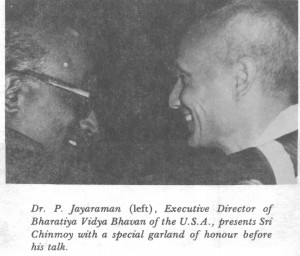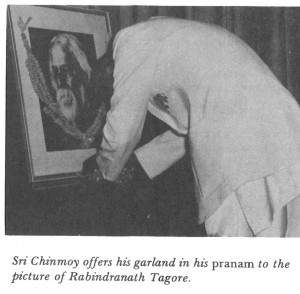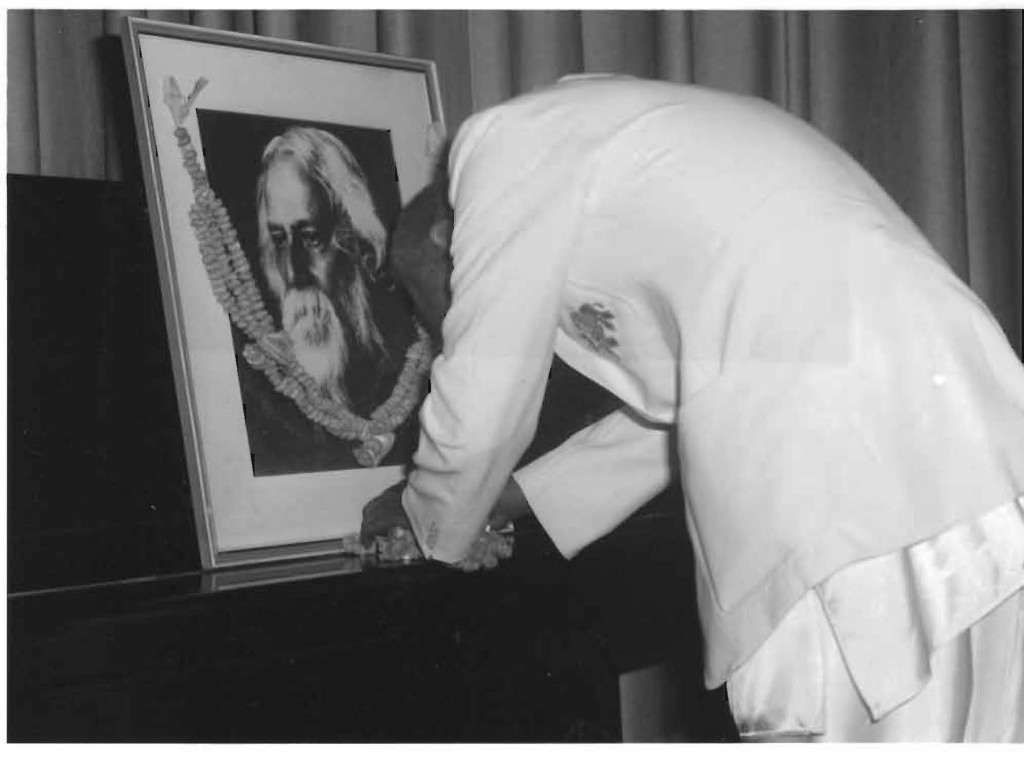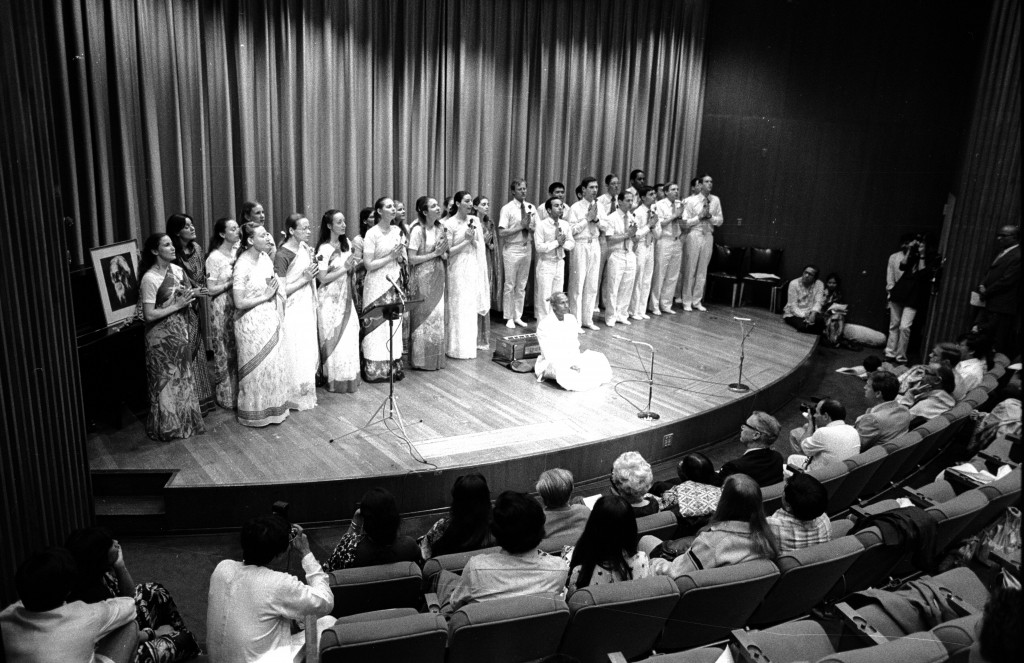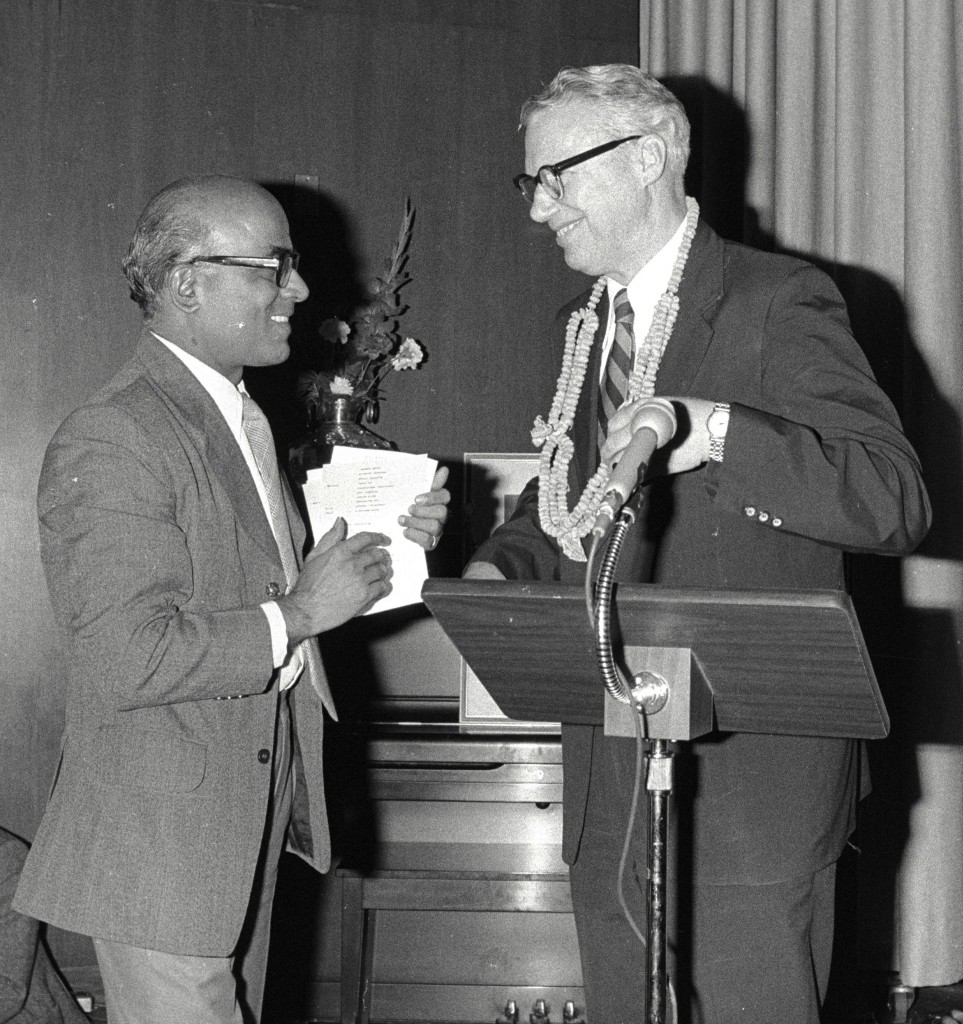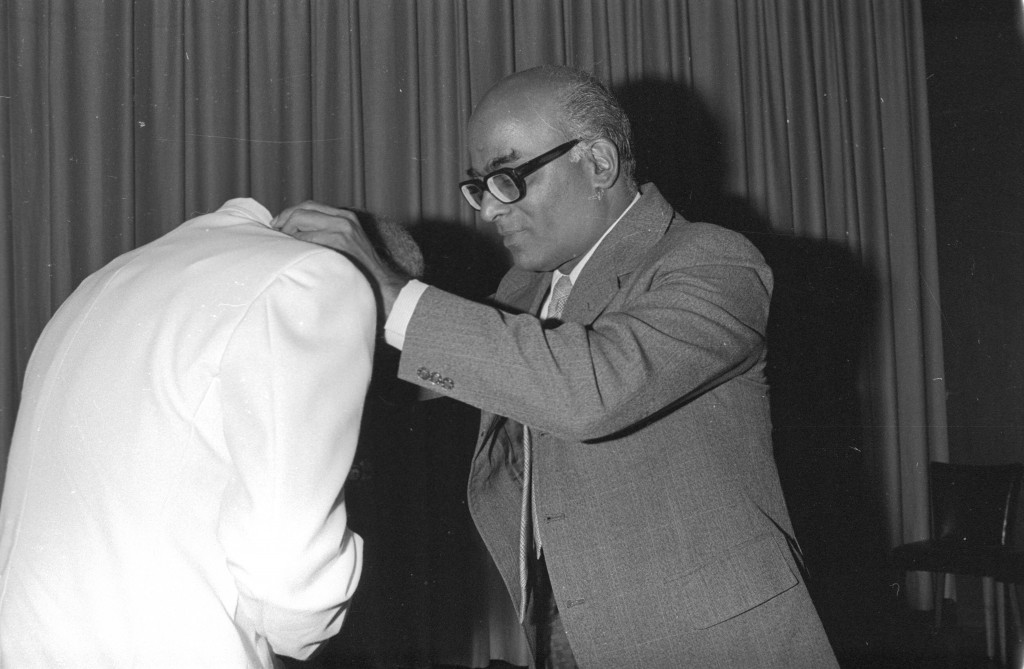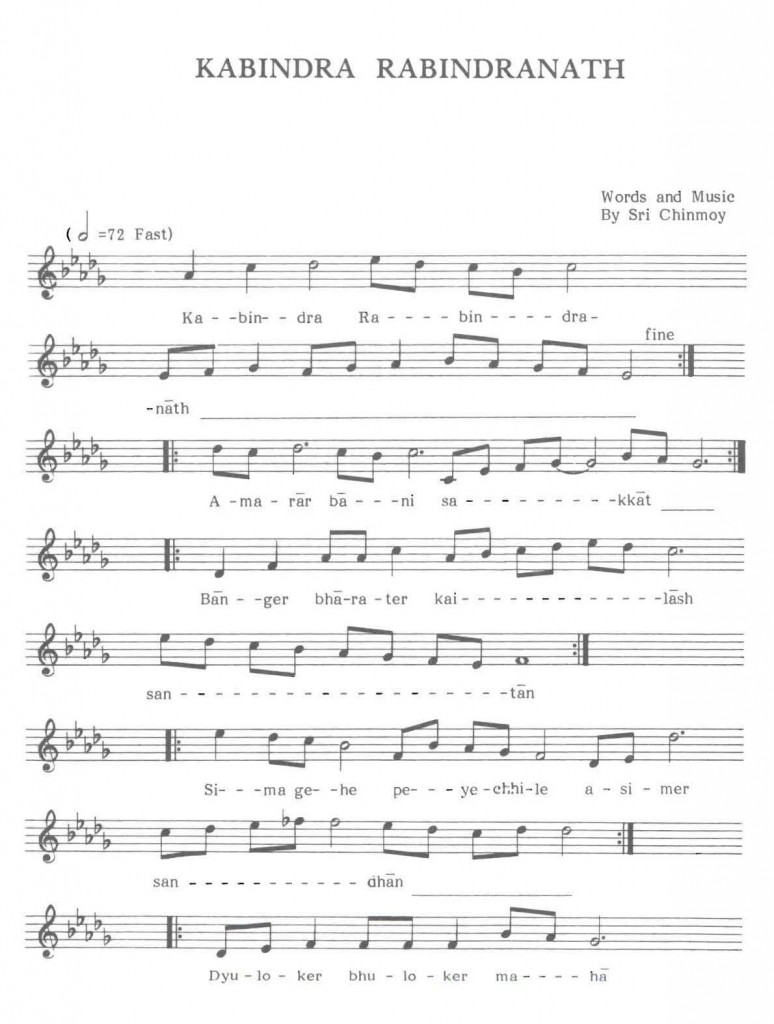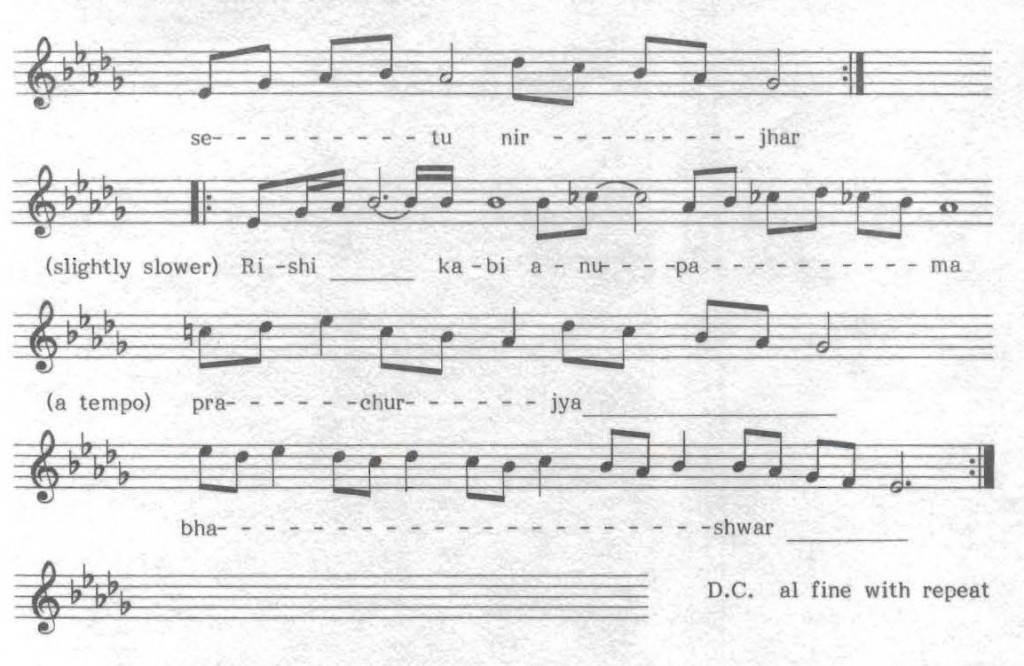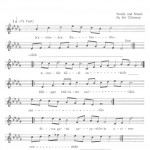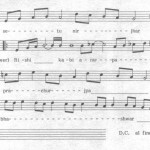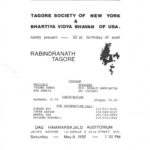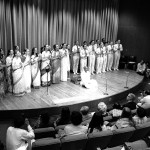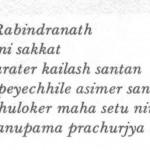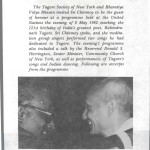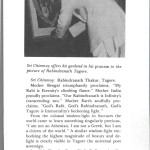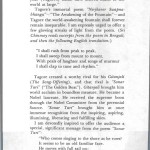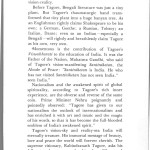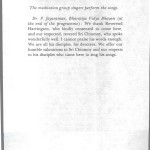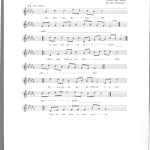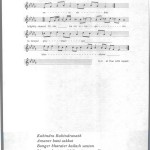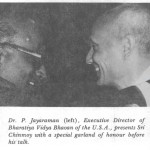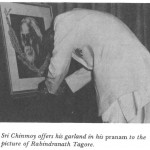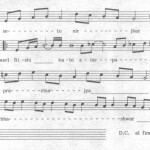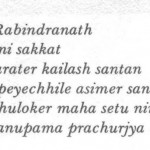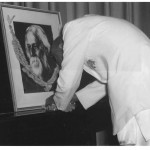Rabindranath Tagore’s 121st Birthday Celebrated : 1982 May 08
Filed under asia-oceana | Music and Songs | Thoughts from the UN community. | Tributes and Expressions of appreciationRabindranath Tagore’s Birthday Celebrated
(below is excerpt from meditation-at-un-may-jun-1982-bulletin/) with some additional photos.
See also
- More Photos- 1982 Rabindranath Tagore’s 121st Birthday: 1982 – PHOTOS
- Programme observed in 1979 by the Meditation Group a few years earlier: Rabindranath Tagore 118th Birthday May 1979
The Tagore Society of New York and Bharatiya Vidya Bhavan invited Sri Chinmoy to be the guest of honour at a programme held at the United Nations the evening of 8 May 1982 marking the 121st birthday of India’s greatest poet, Rabindranath Tagore.
Sri Chinmoy spoke and the meditation group singers performed two songs he had dedicated to Tagore.
The evening’s programme also included a talk by the Reverend Donald S. Harrington, Senior Minister, Community Church of New York, as well as performances of Tagore’s songs and Indian dancing.
Dr. P. Jayaraman (left), Executive Director of Bharatiya Vidya Bhavan of the U.S.A.) presents Sri Chinmoy with a special garland of honour before his talk.
Sri Chinmoy offers his garland in his pranam to the picture of Rabindranath Tagore.
Sri Chinmoy:
Rabindranath Thakur. Tagore. Mother Bengal triumphantly proclaims, “My Rabi is Eternity’s climbing flame.” Mother India proudly proclaims, “Our Rabindranath is Infinity’s transcending sun.” Mother Earth soulfully proclaims, “God’s Rabi, God’s Rabindranath, God’s Tagore is Immortality’s beckoning light.”
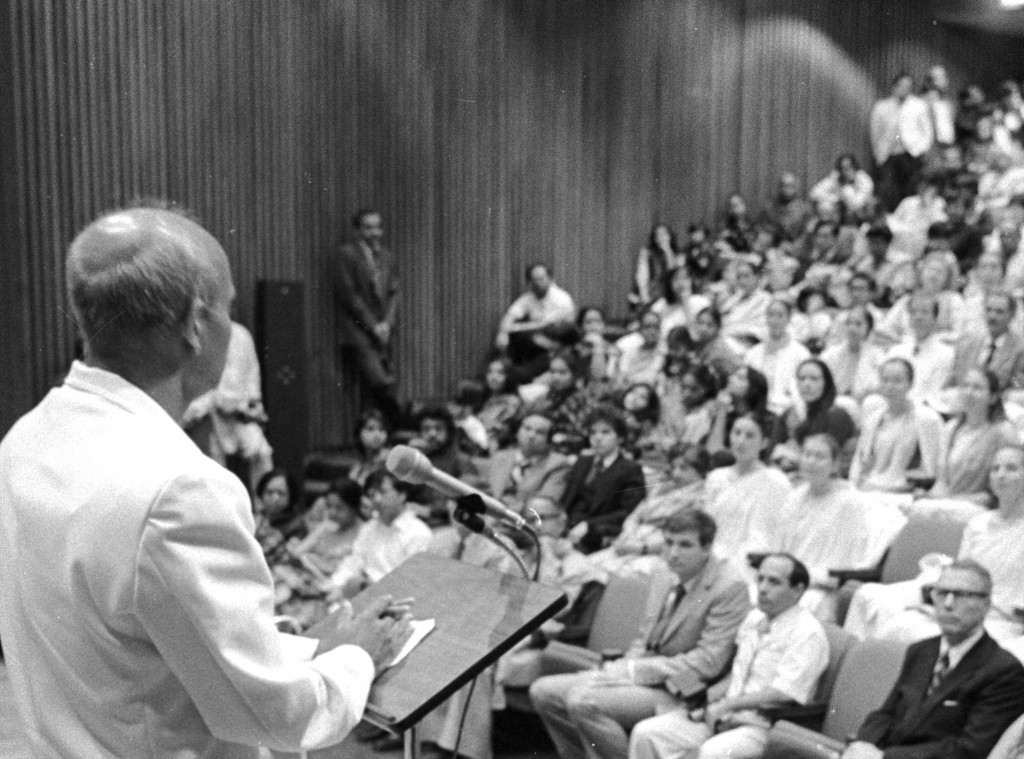 From the colossal wisdom-light in Socrates the world came to learn something singularly precious, “I am not an Athenian, I am not a Greek, but I am a citizen of the world.” A similar wisdom-light embodying the highest magnitude of beauty and delight is clearly visible in Tagore the universal poet sovereign.
From the colossal wisdom-light in Socrates the world came to learn something singularly precious, “I am not an Athenian, I am not a Greek, but I am a citizen of the world.” A similar wisdom-light embodying the highest magnitude of beauty and delight is clearly visible in Tagore the universal poet sovereign.
Jagadish Chandra Basu, Sir J. C. Bose, the discoverer of life instinct in the plant kingdom, and Rabindranath were most intimate friends. The scientist of scientists voiced forth something at once divinely beautiful and supremely fruitful about the poet of poets: “With open palms much have we received from the world; likewise we too, through your (Tagore’s) hand, have offered much to the world at large.”
Tagore’s immortal poem “Nirjharer Swapnabhanga”-” The Awakening of the Fountain”-and Tagore the world-awakening fountain shall forever remain inseparable. I am expressly urged to offer a few glowing streaks of light from the poem. (Sri Chinmoy reads excerpts from the poem in Bengali~ and then the following English translation.)
“I shall rush from peak to peak,
I shall sweep from mount to mount,
With peals of laughter and songs of murmur
I shall clap to tune and rhythm.”
Tagore created a worthy rival for his Gitanjali (The Song-Offering), and that rival is “Sonar Tari,;” (“The Golden Boat”). Gitanjal brought him world acclaim in boundless measure. He became a Nobel laureate. He received the supreme boon through the Nobel Committee from the perennial Source. “Sonar Tari” brought him at once immense recognition from the inspiring, aspiring, illumining, liberating and fulfilling skies. I am devotedly inspired to offer the audience a special, significant message from the poem “Sonar Tariz”:
“Who comes singing to the shore as he rows?
It seems to be an old familiar face. He moves with
full sail on; Looks neither right nor left.
The helpless waves break on either side.
It seems to be an old familiar face.”
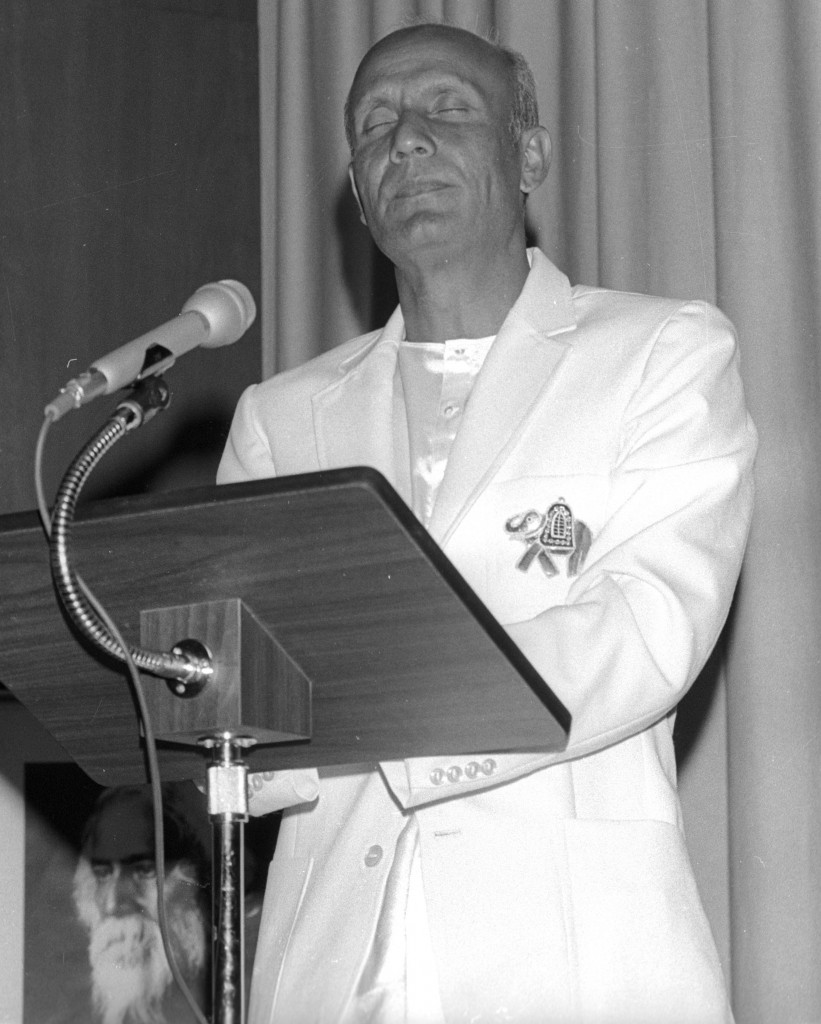 To the seeker-poets, this moment Tagore is the golden boat. The next moment he is the golden passenger. The following moment he is the golden boatman. The golden boat, the golden passenger and the golden boatman are the triune oneness in vision-reality.
To the seeker-poets, this moment Tagore is the golden boat. The next moment he is the golden passenger. The following moment he is the golden boatman. The golden boat, the golden passenger and the golden boatman are the triune oneness in vision-reality.
Before Tagore, Bengali literature was just a tiny plant . But Tagore’s thaumaturgic hand transformed that tiny plant into a huge banyan tree. As an Englishman rightly claims Shakespeare to be his own; a German, Goethe; a Russian, Tolstoy ; an Italian, Dante; even so an Indian-especially a Bengali-will rightly and breathlessly claim Tagore as his own, very own.
“Momentous is the contribution of Tagore’s Viswabharati to the education of India. It was the Father of the Nation, Mahatma Gandhi, who said of Tagore’s vision-manifesting Santiniketan, the Abode of Peace: “Santiniketan is India. He who has not visited Santiniketan has not seen India.”
Nationalism and the awakened spirit of global spirituality, according to Tagore’s rich inner experience, are the obverse and reverse of the same coin. Prime Minister Nehru poignantly and pointedly observed: “Tagore has given to our nationalism the outlook of internationalism and has enriched it with art and music and the magic of his words, so that it has become the full-blooded emblem of India’s awakened spirit.”
Tagore’s vision-sky and reality-sea India will eternally treasure. His immortal message of beauty, love and peace the world will forever cherish. The supreme visionary, Rabindranath Tagore, asks his fellow travelers to remember him thus : “One word keep for me in thy silence, O world, when I am gone: ‘I have loved.’ ”
Now I wish to offer my heart’s most soulful gratitude to the immortal of immortals, Tagore, by offering two Bengali songs of mine. My students will sing them.
The Peace Meditation group choir perform the songs.
Dr. P. Jayaraman, Bharatiya Vidya Bhavan (at the end of the programme):
We thank Reverend Harrington, who kindly consented to come here, and our respected, revered Sri Chinmoy, who spoke wonderfully well. I cannot praise his words enough.
We are all his disciples, his devotees. We offer our humble salutations to Sri Chinmoy and our respects to his disciples who came here to sing his songs.
Song:
Kabindra Rabindranath
Amarar bani sakkat
Banger bharater kailash santan
Sima gehe peyechhile asimer sandhan
Dyuloker bhuloker maha setu nirjhar
Rishi kabi anupama prachurjya bhashwar
Link to PDF
–grey scale scan of photos – optimized (smaller file)
Click on images below to see JPG format in bigger size
See also
- More Photos- 1982 Rabindranath Tagore’s 121st Birthday: 1982 – PHOTOS
- Programme observed by in 1979 by the Meditation Group a few years earlier: Rabindranath Tagore 118th Birthday May 1979
